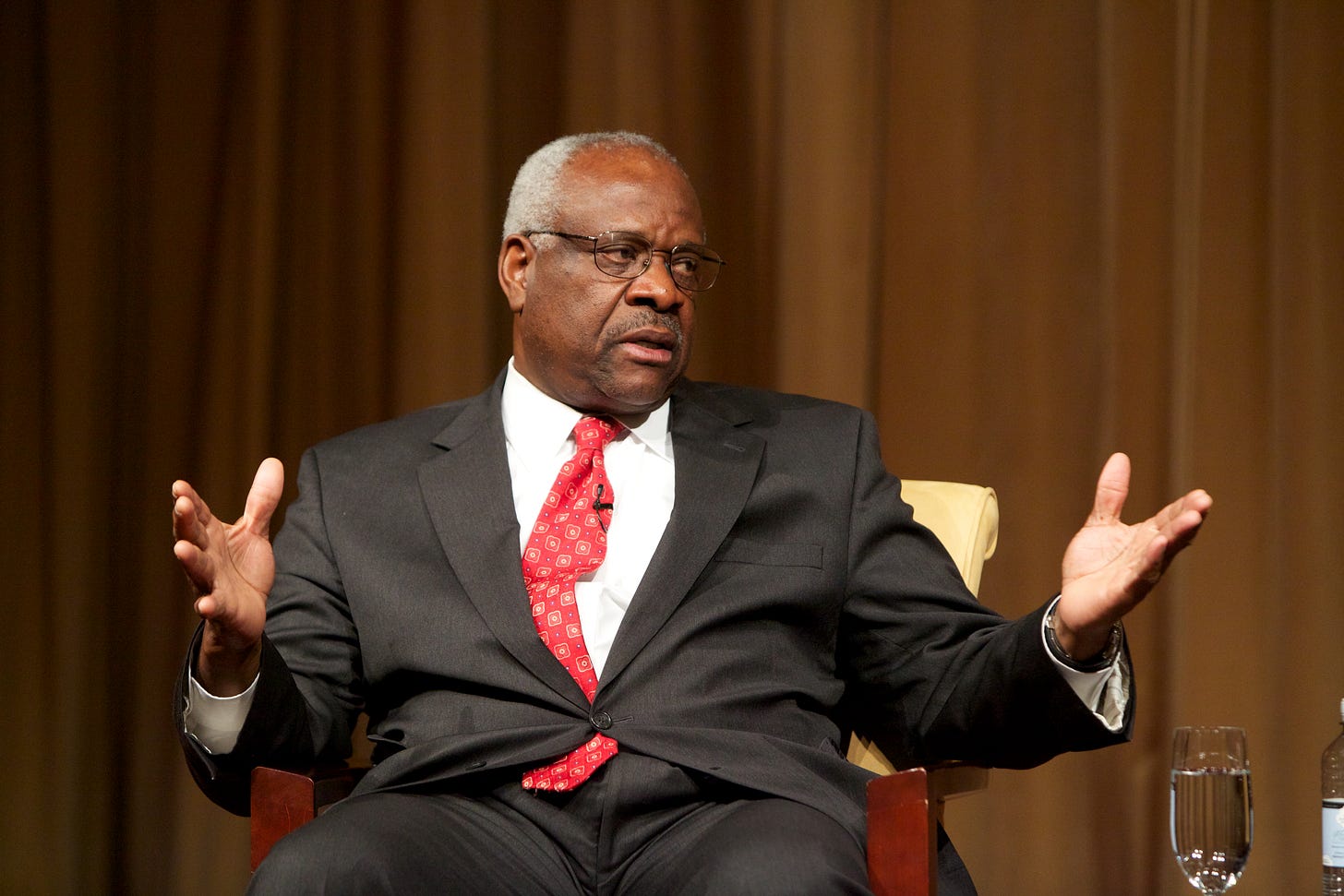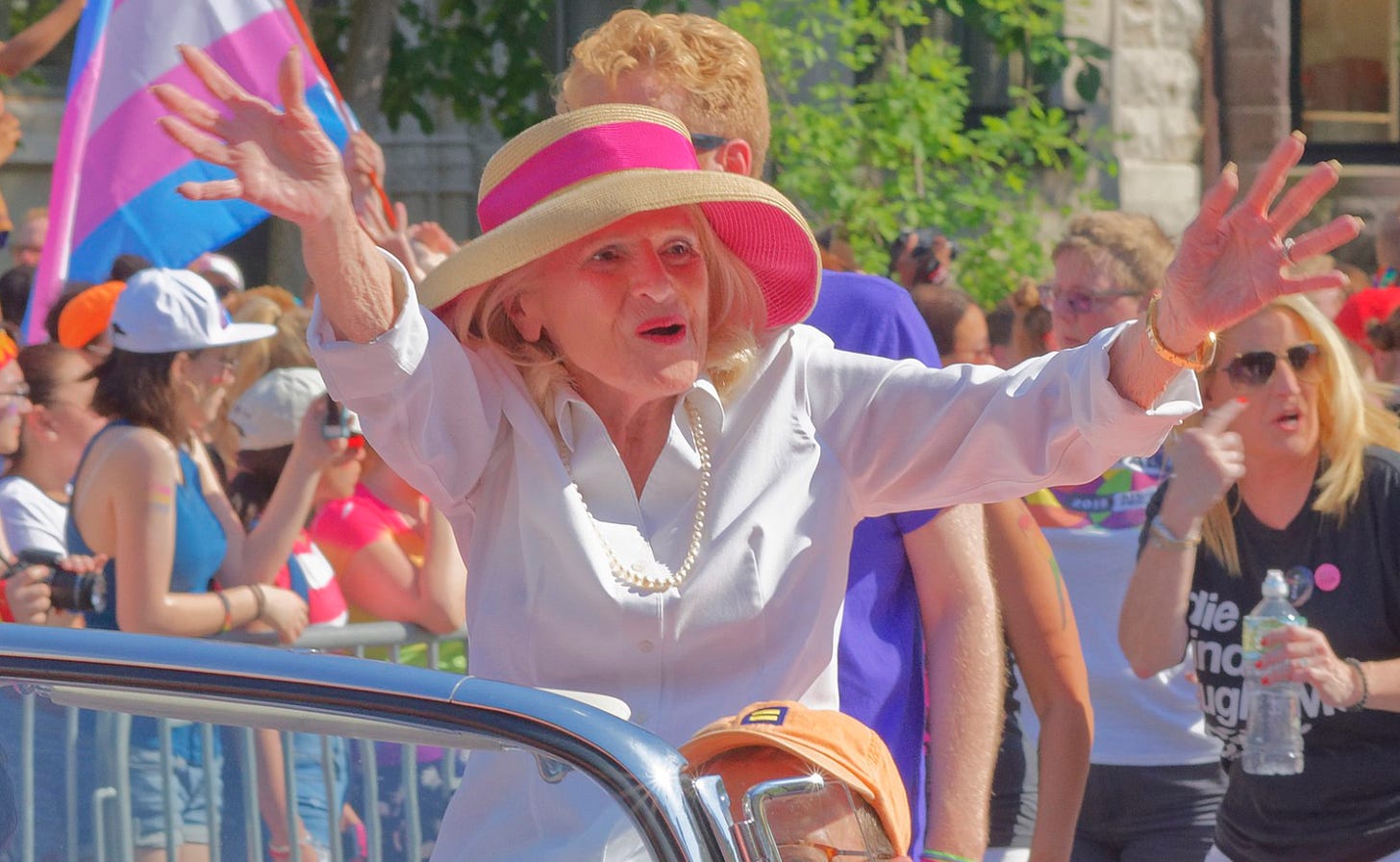Supreme Court Justice Clarence Thomas’ Complete Track Record on LGBTQ Issues
The conservative justice has explicitly stated he’s interested in overturning Obergefell.
Since being sworn in as an associate justice of the Supreme Court of the United States (SCOTUS) in 1991, Clarence Thomas has developed a reputation for his quiet demeanor during oral arguments. As the longest-serving current member of SCOTUS, he has opposed constitutional protections for abortion, LGBTQ rights and affirmative action programs. He is a member of the conservative Federalist Society, and he frequently speaks at events hosted by The Heritage Foundation, the authors of Project 2025.
Thomas’ opinions lean farther right than any other justice on the bench. And as a new push to overturn marriage equality heats up in the U.S., we wanted to understand Thomas’ track record on LGBTQ issues.
Early Life
June 23, 1948
Thomas is born in rural Georgia. Growing up, he has dreams of being a priest. But after experiencing racism at his Catholic high school, he pivots and applies to law school.
1971
Thomas is admitted to Yale Law School “under an explicit affirmative action plan with the goal of having blacks and other minority members make up about 10 percent of the entering class.”
Through the years, Thomas becomes an ardent opponent of affirmative action. Rosa Parks calls out his hypocrisy in 1996, saying he “had all the advantages of affirmative action and went against it.”
May 30, 1987
Thomas marries his second wife Ginni, who is an attorney, conservative activist and political consultant. Ginni is a Jan. 6 sympathizer and member of anti-LGBTQ organizations such as the Council for National Policy, which has been designated a hate group by the Southern Poverty Law Center.
Supreme Court Justice
Oct. 11, 1991
During Thomas’ Supreme Court confirmation hearing, he faces sexual harassment allegations by Anita Hill, who accuses him of making repeated sexual advances during her time as his assistant. Hill alleges that Thomas discussed his penis size, his sex life and his porn consumption in graphic detail and that he made sexual innuendos toward her at work.
Thomas calls the hearings racist and a “high-tech lynching for uppity blacks who in any way deign to think for themselves, to do for themselves, to have different ideas.” Hill and her family are harassed and receive bomb threats in the wake of her allegations. Despite this, Thomas is confirmed by the Senate by a vote of 52-48.
Almost 25 years later, lawyer Moira Smith accuses Thomas of groping her while she was a Truman Foundation scholar in 1999. Thomas denies the allegations.
May 20, 1996
Thomas dissents in Romer v. Evans, the 6-3 decision that strikes down Amendment 2 of Colorado’s State Constitution, which enables discrimination based on “homosexual, lesbian, or bisexual orientation, conduct, practices or relationships.” The decision is seen as a major victory for gay rights. In Justice Antonin Scalia’s dissent, which Thomas joins, he writes about the immorality of homosexuality:
“[T]he society that eliminates criminal punishment for homosexual acts does not necessarily abandon the view that homosexuality is morally wrong and socially harmful.”
June 28, 2000
Thomas dissents in Stenberg v. Carhart, which aimed to overturn a Nebraska law that bans partial birth abortions, a rare procedure used in extreme cases to save the life of the mother. The SCOTUS majority disagrees with Thomas and rules that the law is unconstitutional because it places an undue burden upon a woman’s right to an abortion.
June 26, 2003
The Supreme Court rules in Lawrence v. Texas that sodomy laws are unconstitutional. The case came to the Court after police responded to a false report that a man with a gun was inside another man's apartment. The police instead found two men engaging in consensual sex and they were subsequently arrested for violating Texas’ “Homosexual Conduct” law. Thomas dissents and writes that while the law is “uncommonly silly,” the Texas Legislature should be the one to repeal it and that his job is not to take sympathy with the ruling but rather its constitutionality. Despite his dissent, the law is overturned.
June 26, 2013
Edith Windsor and Thea Spyer—a lesbian couple who married in Canada—move to New York in 2008. The following year, Spyer passes away and Windsor is barred from tax-exempt status to her wife’s estate because of Section 3 of the Defense of Marriage Act, which denies recognition of same-sex marriages at the federal level.
The case, United States v. Windsor, is taken to SCOTUS, which rules 5-4 in Windsor’s favor.
Thomas partially co-signs the dissent that says Windsor’s problem should have been remedied by the courts and that SCOTUS had no right to strike down Section 3. The dissent, written by Justice Samuel Alito, also states:
“It is one thing for a society to elect change; it is another for a court of law to impose change by adjudging those who oppose it hostes humani generis, enemies of the human race.”
June 26, 2015
Thomas writes the dissent in Obergefell v. Hodges, the groundbreaking decision which legalizes gay marriage across the U.S.
"In its haste to reach a desired result, the majority misapplies a clause focused on 'due process' to afford substantive rights, disregards the most plausible understanding of the 'liberty' protected by that clause, and distorts the principles on which this Nation was founded. Its decision will have inestimable consequences for our Constitution and our society."
Thomas’ dissent is noteworthy as SCOTUS references Loving v. Virginia, a case which declared state bans on interracial marriage unconstitutional, as legal precedent in its decision. Thomas’ own marriage would have been illegal without this ruling.
June 15, 2020
In a 6-3 ruling in Bostock v. Clayton County, SCOTUS declares that Title VII of the Civil Rights Act of 1964 includes protections against discrimination on the basis of sexual orientation and gender identity. In a dissent, Alito and Thomas write:
“The question in these cases is not whether discrimination because of sexual orientation or gender identity should be outlawed. The question is whether Congress did that in 1964. It indisputably did not. … Even if discrimination based on sexual orientation or gender identity could be squeezed into some arcane understanding of sex discrimination, the context in which Title VII was enacted would tell us that this is not what the statute’s terms were understood to mean at that time.”
Oct. 5, 2020
SCOTUS declines to take up a case in which Kentucky county clerk Kim Davis refused to grant marriage licenses to same-sex couples on the grounds that doing so would violate her religious beliefs.
In a statement, Thomas writes:
“Due to Obergefell, those with sincerely held religious beliefs concerning marriage will find it increasingly difficult to participate in society without running afoul of Obergefell and its effect on other antidiscrimination laws. … Obergefell enables courts and governments to brand religious adherents who believe that marriage is between one man and one woman as bigots, making their religious liberty concerns that much easier to dismiss. … By choosing to privilege a novel constitutional right over the religious liberty interests explicitly protected in the First Amendment, and by doing so undemocratically, the Court has created a problem that only it can fix. Until then, Obergefell will continue to have ‘ruinous consequences for religious liberty.’”
Although Thomas agrees with the decision not to hear the case, his statement signals a desire to revisit Obergefell and overturn it.
July 2, 2021
Thomas votes for SCOTUS to consider an appeal from a Washington state florist who refused to provide service to a gay couple on the grounds that doing so would violate her religious beliefs. The Court ultimately declines the case, with the dissenting justices not providing elaboration for their decision.
Nov. 1, 2021
Thomas agrees to hear a case from a Catholic hospital that refused to perform a hysterectomy—an element of bottom surgery—for a trans man. The Court ultimately declines to take the case.
June 24, 2022
Thomas joins the 6-3 majority and authors a concurring opinion in Dobbs v. Jackson Women’s Health Organization, which holds that the Constitution does not provide a right to an abortion. The decision overturns Roe v. Wade. Thomas writes:
“As I have previously explained, ‘substantive due process’ is an oxymoron that ‘lack[s] any basis in the Constitution.’ … In future cases, we should reconsider all of this Court’s substantive due process precedents, including Griswold, Lawrence, and Obergefell.”
Substantive due process focuses on rights that are not explicitly written into the Constitution, including LGBTQ rights. Thomas openly flirts with the idea that almost all other precedents that rely on the doctrine of substantive due process should be overturned, with the convenient exception of Loving v. Virginia, which made his own marriage legal.
June 18, 2025
SCOTUS issues a 6-3 ruling in United States v. Skrmetti, which upholds a Tennessee ban on gender-affirming care for transgender youth. The Court claims that the law is not directly targeted at transgender youth and does not violate the Equal Protection Clause of the 14th Amendment, despite them being the only group harmed by the law. In Thomas’ opinion, he writes:
“Extending the Bostock framework here would depart dramatically from this Court’s Equal Protection Clause jurisprudence. We have faced sexual-orientation claims in the equal protection context for decades. … ‘But in those cases, the Court never suggested that sexual orientation discrimination is just a form of sex discrimination’ warranting heightened constitutional scrutiny.”
If objective, nonpartisan, rigorous, LGBTQ-focused journalism is important to you, please consider making a tax-deductible donation through our fiscal sponsor, Resource Impact, by clicking this button:










